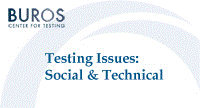Buros-Nebraska Series on Measurement and Testing

Social and Technical Issues in Testing: Implications for Test Construction and Usage
Date of this Version
1984
Document Type
Article
Citation
Published in Social and Technical Issues in Testing: Implications for Test Construction and Usage, edited by Barbara S. Plake (Hillsdale, NJ: Lawrence Erlbaum Associates, 1984).
Abstract
Whenever research is launched under a new paradigm for studying an old set of mental phenomena, researchers joining the new armada of explorers hope, at best, to discover new uncharted mental territories and, at worst, to provide new mental maps of previously charted territories that amend errors of the old maps. This has been I believe, the experience of cognitive psychologists studying mental abilities. Although they may not have revolutionized our map of the mind (yet), neither have they left the old maps standing. What is critical is that at least the flaws and incompleteness’s of the new methods are different from those of the old. One can therefore be provided with some new insights about the mental phenomena being studied. Consider an analogy to polar and Cartesian coordinates: Each provides a different and useful view of a world that is not quite so simple as either coordinate system would have us believe. Seeing the mental world in two ways can tell us more than seeing it in just one way. In the language of Gamer, Hake, and Eriksen (1956), we have provided "converging operations" to view a unitary phenomenon.
I have divided my analysis of the contribution of cognitive psychology to test construction into four main parts dealing, respectively, with the contributions of cognitive psychology to: (1) content for construction of tests; (2) validation of tests; (3) scoring and interpretation of tests; and (4) modification of tests. Before discussing these contributions, however, let me say just what are the characteristics that define "cognitive psychology" and what psychologists do in the cognitive- psychological investigation of intelligence.
Cognitive psychology is the study of the mind in terms of the mental (cognitive) representations and processes that underlie observable behavior. In particular, I find that cognitive researchers tend to address five main questions:
1. What are the mental processes that constitute intelligent task performance?
2. How rapidly and accurately are these processes performed?
3. Into what strategies for task performance do these mental processes combine?
4. Upon what forms of mental representation do these processes and strategies act?
5. What is the knowledge base that is organized into these forms of representation, and how does it affect and become affected by the processes, strategies, and representations that individuals use?
These questions have been asked of performance on a rather wide range of cognitive tasks.


Comments
Copyright © 1984 by Lawrence Erlbaum Associates. Digital edition copyright © 2012 Buros Center for Testing. This book may be downloaded, saved, and printed by an individual for their own use. No part of this book may be re-published, re-posted, or redistributed without written permission of the holder of copyright.